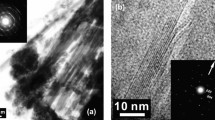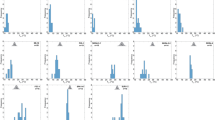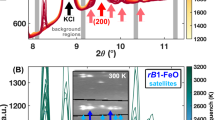Abstract
IT has long been recognized that the electrical conductivity of the lower continental crust is anomalously high. Both pore-saturating brines1–5 and conducting films of carbon at grain boundaries6–10 have been proposed to explain this, but the evidence remains inconclusive. Here we report measurements of electrical conductivity at high temperatures and pressures11–13 on samples of carbon-bearing and carbon-free granulites with a range of electrolyte saturations. The application of pressure to nominally dry carbon-free samples reduces the electrical conductivity as a result of a progressive reduction in pore connectivity, whereas the carbon-bearing samples show an increase in conductivity under the same conditions—an effect that we ascribe to reconnection of carbon conduction pathways during compaction. Moreover, we find a greater increase in conductivity with temperature for the carbon-bearing samples. In the light of work indicating that the abundance of carbon in high-grade rocks has been underestimated in the past7,8, our results provide strong evidence for the role of carbon in lower-crustal conductivity.
This is a preview of subscription content, access via your institution
Access options
Subscribe to this journal
Receive 51 print issues and online access
$199.00 per year
only $3.90 per issue
Buy this article
- Purchase on Springer Link
- Instant access to full article PDF
Prices may be subject to local taxes which are calculated during checkout
Similar content being viewed by others
References
Lee, C. D., Vine, F. J. & Ross, R. G. Geophys. J. R. astr. Soc. 72, 353–371 (1983).
Hyndman, R. D. & Shearer, P. M. Geophys. J. int. 98, 343–365 (1989).
Drury, M. J. & Hyndman, R. D. J. geophys. Res. 18(B9), 4537–4545 (1979).
Shankland, T. J. Nature 340, 102 (1989).
Yardley, B. W. D. Nature 323, 111 (1986).
Alabi, A. O., Camfield, P. A. & Gough, D. I. Geophys. J. R. astr. Soc. 43, 815–833 (1975).
Frost, B. R., Fyfe, W. S., Tazaki, K. & Chan, T. Nature 340, 134–136 (1989).
Mareschal, M., Fyfe, W. S., Percival, J. & Chan, T. Nature 357, 674–676 (1992).
Mathez, E. A. & Delaney, J. R. Earth planet. Sci. Lett. 56, 217–232 (1981).
Fuhrman, M. L., Frost, B. R. & Lindsley, D. H. J. Petrol 29, 699–729 (1988).
Evans, C. J. thesis, Univ. of East Anglia (1980).
Glover, P. W. J. Thesis, Univ. of East Anglia (1989).
Glover, P. W. J. & Ross, R. G. High Temp. High Press. 22, 533–539 (1990).
Duba, Al, Huenges, E., Nover, G., Will, G. & Jödicke, H. Geophys. J. 94, 413–419 (1988).
Padovani, E. & Carter, J. in The Earth's Crust, Its Nature and Physical Properties (ed. Heacock, J. G.) Geophys. Monogr. Ser. 20, 19–25, (Am. Geophys. Un., 1977).
Beamish, D. Geophys. J. R. Soc. 84, 619–640 (1986).
Author information
Authors and Affiliations
Rights and permissions
About this article
Cite this article
Glover, P., Vine, F. Electrical conductivity of carbonbearing granulite at raised temperatures and pressures. Nature 360, 723–726 (1992). https://doi.org/10.1038/360723a0
Received:
Accepted:
Issue Date:
DOI: https://doi.org/10.1038/360723a0
This article is cited by
-
Groundwater exploration by magnetotelluric method within the birimian rocks of mankessim, Ghana
Applied Water Science (2022)
-
Geoelectric structure of northern Cambay rift basin from magnetotelluric data
Earth, Planets and Space (2017)
-
A computing method for 3D magnetotelluric modelling directed by polynomials
Earth, Planets and Space (2014)
-
Electrical conductivity of orthopyroxene and plagioclase in the lower crust
Contributions to Mineralogy and Petrology (2012)
-
Origin of High Electrical Conductivity in the Lower Continental Crust: A Review
Surveys in Geophysics (2011)
Comments
By submitting a comment you agree to abide by our Terms and Community Guidelines. If you find something abusive or that does not comply with our terms or guidelines please flag it as inappropriate.



